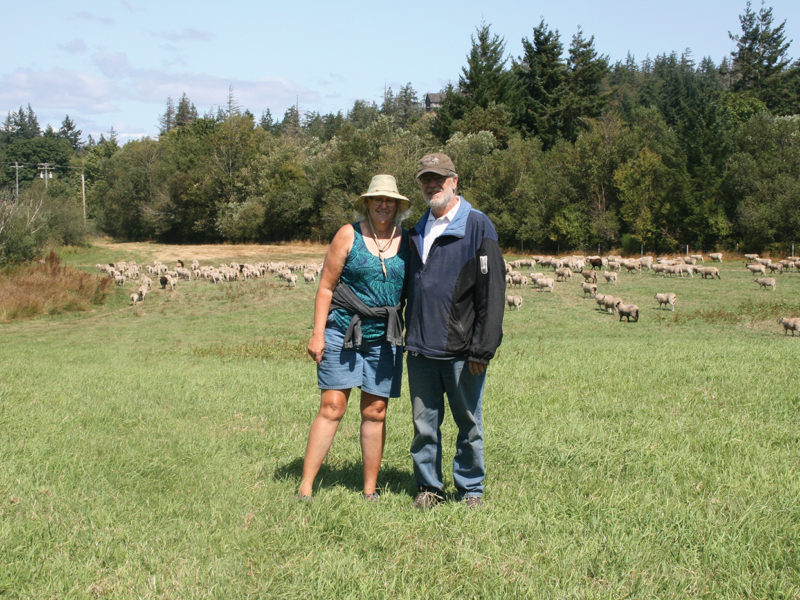METCHOSIN – While the province has been keen to support land-matching to help new farmers launch their operations, leasing farmland is a long-standing practice in BC that’s been vital to many farm businesses.
Recent research by the provincial government’s Behavioural Insights Group underlined the importance of land leases to agriculture, stating that it’s commonplace for BC landowners to lease unused farmland to farmers.
John and Lorraine Buchanan of Parry Bay Sheep Farm in Metchosin on southern Vancouver Island only own two acres, yet they are one of the biggest operations on Vancouver Island.
“We lease all of the land we farm,” says Buchanan. “The land ranges from two to 200 acres for about 1,000 acres in total.”
Parry Bay has 30 pastures and croplands spread over a large geographic area, from Central Saanich to Metchosin. The Buchanans grow barley, wheat, oats, kale and turnips, as well as hay and pasture for their large flock of sheep.
“In the mostly suburban areas where we farm, it is the most economical way to get onto the land,” explains Buchanan. “We have had no issues in the 40 years that we have been farming with this arrangement.”
Economical
Bill Zylmans of W & A Farms in Richmond agrees with that observation.
“Of the 400 acres that we are farming, we own 70 of that,” says Zylmans. “The costs are much less to lease compared to buying in an area that has become quite urban.”
Zylmans calls himself the “biggest dirt farmer in Richmond,” based on the number of cultivated acres that he farms, outside of the region’s blueberry and cranberry farms.
He leases a range of parcel sizes. As a seed potato farmer, he is happy if he can rent six to 12-acre parcels for the different seed potato varieties he grows. He has a long-term lease for 200 acres from the Vancouver Fraser Port Authority, along with leases from non-farmers and other farmers.
“I lease from older farmers who want to see their land farmed,” says Zylmans. “One of the farms that I lease is from a widow whose husband passed away. It is a win-win for people who want their land farmed and looked after, and they can receive a property tax reduction.”
Zylmans also subleases to other farmers for rotational purposes. It introduces diversity into the cropping system, which in turn benefits the land.
One thing that Zylmans stresses is the importance of good-quality land.
“We have the [Agricultural Land Reserve] which provides great protection to good land. We can’t afford to farm marginal land anymore. It has to be top-notch,” says Zylmans, a former vice-chair of the Agricultural Land Commission’s South Coast panel. “They aren’t making any more farmland.”
Zylmans says that it’s more cost-effective to keep good quality farmland in good shape. It no longer pays to put in infrastructure improvements and extra inputs to upgrade marginal land. However, lower quality farmland can host greenhouse operations and other uses that don’t require highly productive soil.
Long-term leases preferred
He prefers long-term leases that give him the confidence to make investments and manage the land with a view to its long-term quality. A short-term lease doesn’t offer the same incentive.
“I like to see a five to 10-year timeframe with a first-refusal option to purchase so that I can put money in and do necessary work like cleaning ditches, fertilizing or enhancing the land,” says Zylmans. “Farmers are the best stewards of the land.”
The BC Land Matching Program managed by the Young Agrarians provides a new spin on the old practice of leasing land, providing a customized service to help match those looking for farmland to rent with landowners who are interested in leasing part – or all – of their land for farm use. The program launched in Metro Vancouver in 2016, and matching began in 2017.
With support from the province, the program expanded across BC in 2018. Young Agrarians now has five trained land-matchers in BC covering Vancouver Island and Gulf Islands, Metro Vancouver and the Fraser Valley, the Okanagan-Thompson, Columbia Basin and Central and Northern BC. The team offers a range of support services, lease forms and materials and recently released a “BC Transition Tool Kit” to help with non-family land transfers.
To date, just under 600 people have registered for the program: 334 land-seekers and 264 landowners. Early in the COVID-19 pandemic enquiries for land from land-seekers doubled but this has since levelled off, says Darcy Smith, BC Land Program Manager at Young Agrarians. At the same time, there has been a slight decline in landowner enquiries.
“I would say that there’s a wide variety of people participating in the BCLMP for both land seekers and landholders – folks of all ages, production types, backgrounds, etc. – where the unifying thread is a focus on building resilient food systems and providing opportunities to farmers to grow viable farm businesses,” explains Smith.
The program recently made its 100th match. For the 81 land matches with statistics available from the BC Ministry of Agriculture, Food and Fisheries, 4,653 acres are being leased for farming through the program.
Tenure documented
Statistics Canada’s Census of Agriculture, which is set to take place this May, records land tenure. The last census in 2016 reported 17,528 farms in BC covering a total of 6.4 million acres. Nearly half of this acreage was owned, with the rest leased from governments, non-farmers, other farmers, or rented under other arrangements such as crop-sharing.
BC Assessment reports 11,138 farm properties on the 2021 tax roll, of which 869,382 acres are leased. This does not reflect area leased from one farmer to another for cover crop rotations or other arrangements. It also doesn’t reflect properties being farmed but not holding farm class status. It is also not indicative of the total number of leases in the province, as a farm can have more than one tenant.


 Kelowna school embraces new container farm
Kelowna school embraces new container farm